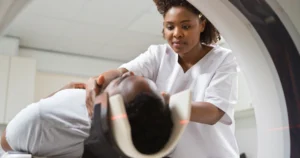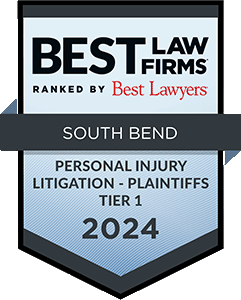 There are many types of injuries you may suffer during a car accident. However, not all of them are immediately apparent following the crash. In some cases, you may suffer an injury that takes several hours or days to appear.
There are many types of injuries you may suffer during a car accident. However, not all of them are immediately apparent following the crash. In some cases, you may suffer an injury that takes several hours or days to appear.
Below, the South Bend car accident lawyers at Pfeifer, Morgan & Stesiak discuss the types of delayed injuries many victims suffer during a car crash. If you believe you or someone you love was injured in an auto accident caused by another’s negligence, contact us to schedule a free, no obligation consultation.
We will review your claim to help you find out if you may be entitled to compensation for a delayed injury, such as:
1. Whiplash
Whiplash is a common type of soft tissue injury that occurs in the neck often during rear-end car accidents. Whiplash may occur when your head and neck are jerked forward and suddenly stop with the motion of your vehicle.
This irregular motion causes the nerves, muscles and joints in your neck to overextend past their typical range of motion, resulting in soft tissue damage.
Often, the symptoms of whiplash become noticeable within 12 hours or five days after the car accident. Some of the most common symptoms that indicate whiplash include:
- Neck pain
- Pain in the shoulders, head and upper back
- Headaches
- Blurred vision
- Dizziness
- Sleep disturbances
- Tinnitus
Minor whiplash injuries typically heal within a month, but severe injuries can require several months to heal and may leave permanent pain. Treatment may include physical therapy as well as medication for pain.
2. Concussion
Concussions are a type of traumatic brain injury (TBI) that occur when the victim receives a blow to the head, forcing the brain to collide with the skull inside the head.
A concussion can also happen without a physical blow to the head, such as when the head jerks forward and then back into position when the vehicle comes to a sudden stop during a collision.
Although concussions are a common type of injury sustained during a car crash, many of the symptoms can be delayed or disguised as another type of injury. This includes:
- Disorientation
- Headaches
- Mood swings
- Irritation
- Loss of equilibrium
- Sleep or eating disturbances
- Slowed responsiveness
- Light and sound sensitivity
To determine if you may have suffered a concussion during a car crash, you should seek medical attention as soon as possible. Although most concussions heal within a few days, you may suffer long-term complications if you leave the condition untreated or have suffered multiple concussions in the past.
3. Psychological Trauma
Many car accident victims report suffering emotional distress after the collision. This is often diagnosed as post-traumatic stress disorder (PTSD) and may cause long-term psychological or emotional suffering.
Often, the symptoms and effects of PTSD take time to develop and may severely impact several aspects of your life. Some of the most commonly reported symptoms of PTSD include:
- Flashbacks of the accident
- Inability to perform usual tasks for work or everyday life
- Fear of driving or traveling in a vehicle
- Irritability
- Mood swings
- Anxiety
- Depression
- Hopelessness
- Disruption to eating and sleeping
Unfortunately, the symptoms of PTSD are often unrecognized by car accident victims. This may result in victims downplaying their emotional distress or neglecting to seek treatment. However, a qualified personal injury lawyer in South Bend may help you determine if you can be compensated for the emotional distress you suffered after a car accident.
4. Soft Tissue Damage
Soft tissue injuries occurs when your body’s ligaments, tendons or muscles suffer significant damage. Typically, these injuries are referred to as strains, sprains and contusions (bruising), and can occur in any part of your body.
Symptoms of soft tissue injuries include:
- Pain in the affected area
- Difficulty bearing weight
- Discoloration
- Inflammation
- Stiffness
- Soreness
In many cases, the symptoms of a soft tissue injury may develop until one day or a week after acquiring one during a car accident.
5. Back Injuries
Back injuries caused by a car accident can include sprains, spinal cord injuries, herniated discs, soft tissue injuries to the muscles in the back, pinched nerves and other injuries.
The symptoms of a back injury may include:
- Severe pain
- Numbness or tingling
- Pain in the neck or shoulders
- Stiffness
- Muscle spasms
Back injuries may present symptoms in the hours or days following a car accident. Treatment and recovery times vary greatly based on the type of back injury sustained. Severe back injuries run the risk of chronic issues such as pain or reduced mobility.
Schedule a Free Consultation
After a car accident, you should always seek medical attention from a health care provider to determine if you have suffered a delayed or hidden injury. Failing to do so may cause long-term medical issues and prevent you from receive the full amount of compensation you deserve.
Pfeifer, Morgan & Stesiak’s trusted auto accident attorneys in South Bend understand the complications that can occur when you suffer a delayed injury. We know how to build a case that shows your delayed injury is related to the car accident and will help you pursue compensation for your medical expenses, lost wages, and pain and suffering. All of our services are provided at no upfront cost, which means you only have to pay us if we recover compensation for your claim.
Call (574) 444-0741 today.











